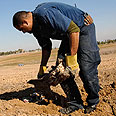
Qassa, rocket in Negev field
צילום: אמיר כהן
Make Gazans choose
Gaza Strip residents must reject terrorism – or face the consequences
Israel’s leadership is debating. On the one hand, it knows (or so we hope) that the situation in Sderot and Gaza-region communities cannot continue. Yet on the other hand it is justifiably worried about the price of a large-scale ground operation that could exact a heavy casualty toll and burden us with responsibility for the fate of Gaza residents.
Israel subjected itself to yet another limitation: Avoiding a humanitarian blow to Gaza residents who are uninvolved in terrorism.
As usual with this government and the person who heads it, it chose to do a little of this and a little of that: Partial humanitarian pressure on the one hand, and limited military activity on the other hand. But as we know, a little of this and a little of that is not enough of both.
As if the Gaza population is not suffering right now, and as if a particular kind of suffering that lasts for years and with no end in sight is better than massive pressure for a limited time.
The State seeks all sorts of explanations to show the High Court of Justice that partially cutting off the electricity supply to Gaza does not constitute a humanitarian blow. That’s nonsense, as such measure would clearly hurt the population, but what’s the alternative? After all, the problem is that terrorists disguise themselves and hide among a population that does not reject or object to terror. In fact, it supports it, and terrorists are able to assimilate into it.
Seemingly, Gaza residents should have maintained a quiet border with Israel. After all, they received something they were never given before: They are their own masters. The Egyptians did grant them this option before 1967 and nobody else granted them this opportunity either. This is the first time they can manage their own affairs. Yet still, they support terrorism and give it shelter.
This is an extreme situation and therefore it requires an extreme solution. The civilian pressure on the population should bring about an end to rocket attacks on Israel. I’m not talking about curbing the flow of water, food, and medicine, yet all the rest should be curbed completely.
Don’t risk troops needlessly
The State must openly and courageously face the High Court of Justice and say: “This is Israel’s foreign and defense policy. We are obligated to do it in order to protect our citizens, and this is better both for Gazans and for us over a large-scale operation in the Strip that would involve losses among our troops and among the civilian population in Gaza.”I’m certain that the High Court of Justice will respect this – it will certainly respect such stance much more than the ridiculous attempts to explain that such moves would not hurt the population.
After all, even if ultimately we discover that Gaza residents prefer to sit by candlelight as long as the rocket attacks continue, we would be able to embark on a wide-scale operation then. In the framework of phased punishments, we should view the cutting off of electricity and fuel as a lower phase than injury or death in a military operation.
The pressure exerted on our own population by terror groups is unacceptable and must be met with unusual pressure on the same population whose support constitutes terror’s main source of oxygen and fuel.
Even if ultimately we are forced to embark on a broad Gaza operation, we must not approach it as if it’s a surgical operation requiring microscopic levels of accuracy. Rather, we must call on the civilian population to evacuate its homes. We must fight in order to win, but without risking our troops needlessly. It is better to see a whole Gaza neighborhood turning into ruins than seeing funerals for our soldiers.
We must “soften up” and pulverize any resistance before our troops go in, and this – as Gazans would also agree – is less desirable than sitting by candlelight. We must tell Gaza residents: “One way or another, quiet will prevail here. You can choose whether this will be done through sitting in the darkness or through turning your backyards into ruins.”
The dilemma should be shifted to them. They should choose how they want quiet to be achieved.










